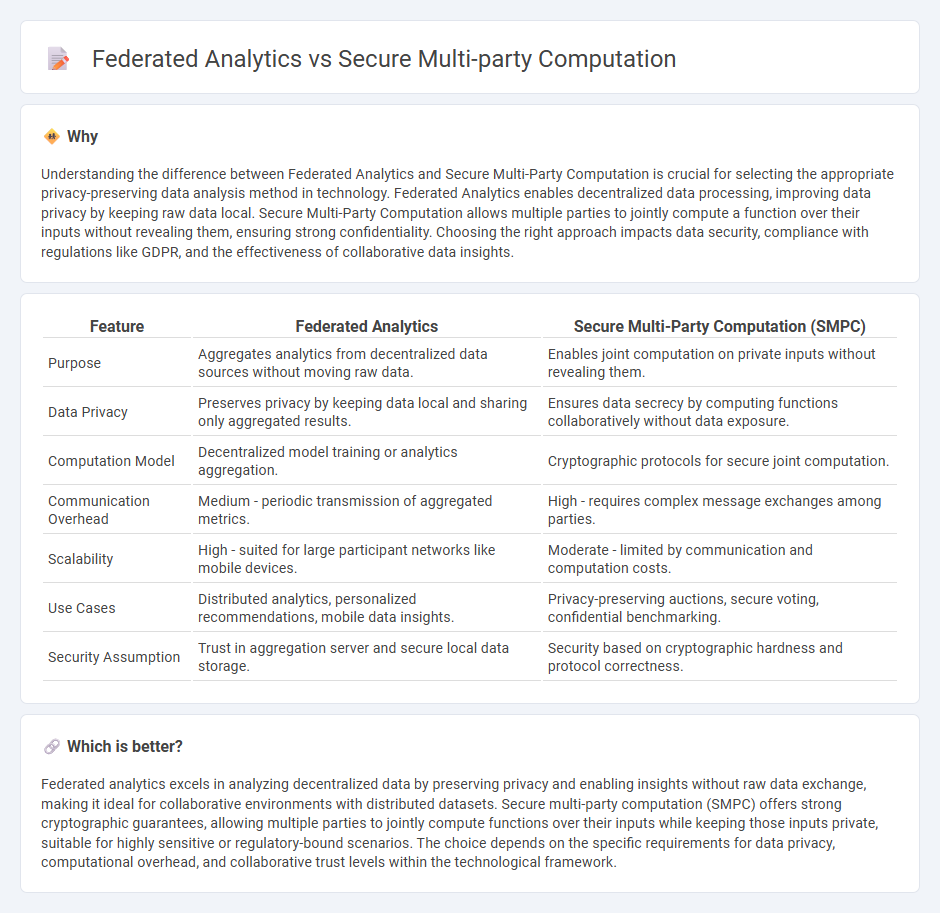
Federated analytics enables data analysis across multiple decentralized sources without transferring raw data, preserving privacy while extracting valuable insights. Secure multi-party computation (SMPC) allows multiple parties to jointly compute a function over their inputs while keeping those inputs private, ensuring confidentiality and data security. Explore the distinctions and applications of federated analytics and SMPC to understand their roles in advancing privacy-preserving technologies.
Why it is important
Understanding the difference between Federated Analytics and Secure Multi-Party Computation is crucial for selecting the appropriate privacy-preserving data analysis method in technology. Federated Analytics enables decentralized data processing, improving data privacy by keeping raw data local. Secure Multi-Party Computation allows multiple parties to jointly compute a function over their inputs without revealing them, ensuring strong confidentiality. Choosing the right approach impacts data security, compliance with regulations like GDPR, and the effectiveness of collaborative data insights.
Comparison Table
| Feature | Federated Analytics | Secure Multi-Party Computation (SMPC) |
|---|---|---|
| Purpose | Aggregates analytics from decentralized data sources without moving raw data. | Enables joint computation on private inputs without revealing them. |
| Data Privacy | Preserves privacy by keeping data local and sharing only aggregated results. | Ensures data secrecy by computing functions collaboratively without data exposure. |
| Computation Model | Decentralized model training or analytics aggregation. | Cryptographic protocols for secure joint computation. |
| Communication Overhead | Medium - periodic transmission of aggregated metrics. | High - requires complex message exchanges among parties. |
| Scalability | High - suited for large participant networks like mobile devices. | Moderate - limited by communication and computation costs. |
| Use Cases | Distributed analytics, personalized recommendations, mobile data insights. | Privacy-preserving auctions, secure voting, confidential benchmarking. |
| Security Assumption | Trust in aggregation server and secure local data storage. | Security based on cryptographic hardness and protocol correctness. |
Which is better?
Federated analytics excels in analyzing decentralized data by preserving privacy and enabling insights without raw data exchange, making it ideal for collaborative environments with distributed datasets. Secure multi-party computation (SMPC) offers strong cryptographic guarantees, allowing multiple parties to jointly compute functions over their inputs while keeping those inputs private, suitable for highly sensitive or regulatory-bound scenarios. The choice depends on the specific requirements for data privacy, computational overhead, and collaborative trust levels within the technological framework.
Connection
Federated analytics leverages Secure Multi-Party Computation (SMPC) to enable multiple parties to collaboratively analyze data without exposing sensitive information. SMPC protocols ensure that data remains encrypted and privacy-preserving throughout the computation process, enhancing security in decentralized environments. This integration allows organizations to derive insights from combined datasets while strictly maintaining data confidentiality and compliance with privacy regulations.
Key Terms
Data privacy
Secure multi-party computation (SMPC) enables multiple parties to jointly compute a function over their inputs while keeping those inputs private, ensuring that no individual party learns the other parties' data. Federated analytics allows for the aggregation and analysis of data across decentralized sources without sharing raw data, typically by sending models or queries rather than datasets, thus preserving privacy. Explore their mechanisms and use cases in greater detail to understand how each approach enhances data privacy in collaborative environments.
Distributed computation
Secure multi-party computation (SMPC) enables multiple parties to collaboratively compute a function over their inputs while keeping those inputs private, using cryptographic protocols to ensure data confidentiality throughout the process. Federated analytics distributes data processing across decentralized nodes, aggregating insights without sharing raw data, optimizing scalability and reducing latency in distributed environments. Explore the distinctions and applications of these distributed computation techniques to enhance privacy-preserving data analysis.
Cryptographic protocols
Secure multi-party computation (SMPC) employs advanced cryptographic protocols such as secret sharing and homomorphic encryption to enable multiple parties to jointly compute functions over their inputs while keeping those inputs private. Federated analytics leverages cryptographic techniques like differential privacy and secure aggregation to analyze decentralized data without exposing individual datasets. Explore deeper into cryptographic protocols driving SMPC and federated analytics to enhance privacy-preserving data collaboration.
Source and External Links
What is Secure Multiparty Computation? - Secure Multiparty Computation (SMPC) is a robust cryptographic technique that enables secure computations on private data without revealing the data itself.
What Is Multiparty Computation? - Multiparty computation protects data during collaborative computations by allowing different parties to jointly compute a function without revealing their inputs.
Secure Multi-Party Computation - Secure multi-party computation is a subfield of cryptography that allows multiple parties to jointly compute a function over their private inputs while keeping those inputs confidential.
 dowidth.com
dowidth.com